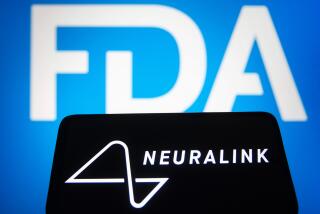U.S. Announces Safety Rules for Gene Therapy Tests
WASHINGTON — The two federal agencies that oversee gene therapy experiments announced Tuesday that researchers will be required to routinely submit plans for monitoring patient safety to federal health officials.
Scientists already are supposed to have monitoring plans to ensure that patients are fully informed of the risks and benefits of trials, that the research is conducted according to its design and that the reporting of data to federal agencies is accurate and complete. But this is the first time that the Food and Drug Administration has demanded to see them.
Monitors, chosen by the researchers or other trial sponsors, such as drug companies, do not have direct access to patients but nevertheless “provide real-time oversight of the clinical conduct of the trial,” said Dr. Kathryn C. Zoon, director of the FDA’s center for biologics.
“We will review the plans, see if they are appropriate and, if modifications are necessary, we will request them,” she added.
The agency also will dispatch its own investigators to conduct unannounced “for cause” visits to trial sites if it suspects that patient rights are being violated or if the monitoring plans are deficient in other ways.
This move “addresses emerging evidence that the monitoring by study sponsors of several recent gene therapy trials has been less than adequate,” the FDA said in a statement, calling clinical trial monitoring “a powerful tool in enhancing the safety and protection of research subjects during a trial.”
The latest action is not expected to be greeted warmly by researchers, many of whom already feel overburdened by reporting requirements imposed by the two agencies.
While investigators must report serious adverse reactions to the FDA immediately if they are thought to be related to the experimental therapy or are unexpected, the National Institutes of Health has insisted that all side effects be reported to its officials, regardless of how important or insignificant they appear.
Unlike most biomedical research, which is monitored only by the FDA, the field of gene therapy has been subject to unusual joint oversight by both agencies--the NIH’s mandate is to promote public discussion of safety and other issues, while the FDA has regulatory authority over the conduct of the trials, including the power to halt them if necessary.
In a second action, the NIH, which provides funding for the trials and helps disseminate public information about them, announced that it will sponsor a series of public forums, likely four times a year. The discussions will center on medical and scientific data from gene therapy trials with the idea of improving their conduct and enhancing the design of future trials.
“These will be focused on safety, the here and now--how do we make things safer for the patients,” said Dr. Amy Patterson, director of NIH’s office of biotechnology activities.
The research has been the focus of intense scrutiny from federal health officials in recent months, following the death of an 18-year-old Arizonan who was participating in a gene therapy experiment at the University of Pennsylvania’s Institute of Gene Therapy.
He had volunteered for the experimental treatment with the hope of curing his rare genetic disorder, ornithine transcarbamylase deficiency, which prevents the liver from breaking down ammonia, a normal byproduct of protein digestion. He died after researchers infused a genetically modified virus into his liver in an attempt to introduce new genes that could correct the flawed genes responsible for his ailment.
In the aftermath of his death, the FDA determined that the institute had violated a series of federal regulations and stopped all gene therapy trials there.
Zoon refused to speculate whether a monitoring plan could have prevented the events at the University of Pennsylvania but said of the researchers there: “They didn’t have a plan.”
The first NIH-sponsored symposium will take place later this week during the scheduled meeting of the NIH’s Recombinant DNA Advisory Committee. NIH said that scientists and physicians are scheduled to discuss the safety and future human applications of a new class of adenoviral vectors--viruses used to transport the new genes--that have been extensively altered with the aim of improving their safety.
Meanwhile, Sen. Edward M. Kennedy (D-Mass.) announced that he would consider introducing legislation to strengthen the oversight framework for gene therapy. “We must do all we can to see that patients who volunteer . . . are protected from unnecessary risk and are fully informed of the potential side effects,” Kennedy said.






